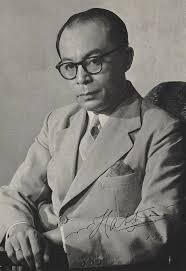
Mohammad
Mohammad Hatta, often overshadowed by his charismatic counterpart Soekarno, was a visionary leader who played a pivotal role in Indonesia’s struggle for independence and the nation’s early years of development. A meticulous thinker, astute diplomat, and unwavering advocate for democracy and social justice, Hatta’s contributions to Indonesia’s founding and subsequent progress are undeniable.
Born in Bukittinggi, West Sumatra, in 1902, Hatta’s upbringing instilled in him a deep sense of social responsibility and a thirst for knowledge. He excelled in his studies, pursuing higher education in the Netherlands, where he was exposed to progressive ideas about democracy, socialism, and cooperative economics. These formative experiences shaped his worldview and laid the foundation for his future leadership.
Upon returning to Indonesia in the 1920s, Hatta immersed himself in the burgeoning nationalist movement. He co-founded the Indonesian National Party (PNI) and became a prolific writer, using his sharp intellect and persuasive prose to rally support for the cause of independence. Hatta’s pragmatic approach and diplomatic skills were instrumental in navigating the complex political landscape, fostering unity among diverse factions within the nationalist movement.
As Indonesia’s independence struggle intensified, Hatta’s leadership and diplomatic acumen proved invaluable. He played a key role in the negotiations with the Japanese occupiers during World War II, skillfully maneuvering to secure Indonesia’s position for self-determination. Alongside Soekarno, Hatta proclaimed Indonesia’s independence on August 17, 1945, a momentous occasion that marked the end of colonial rule and the dawn of a new era for the nation.
Hatta served as Indonesia’s first Vice President under Soekarno, a position he held until 1956. During this time, he focused on economic development, championing cooperative principles and establishing the foundation for Indonesia’s economic infrastructure. Hatta’s vision for a just and equitable society extended beyond economics, as he tirelessly advocated for democracy, human rights, and the rule of law.
Hatta’s legacy extends far beyond his political accomplishments. He was a prolific writer, leaving behind a wealth of essays, articles, and books that continue to inspire and inform Indonesians today. His ideas on democracy, social justice, and economic development remain relevant, offering valuable insights for navigating the challenges of the 21st century.
Mohammad Hatta, the often-overlooked visionary of Indonesian independence, stands as a testament to the power of intellect, diplomacy, and unwavering dedication to the ideals of freedom, justice, and progress. His contributions to Indonesia’s founding and the nation’s early development are immeasurable, and his legacy continues to inspire generations of Indonesians to strive for a more just and prosperous society.
By: Damar Jati Pamungkas
Write and Win: Participate in Creative writing Contest & International Essay Contest and win fabulous prizes.


